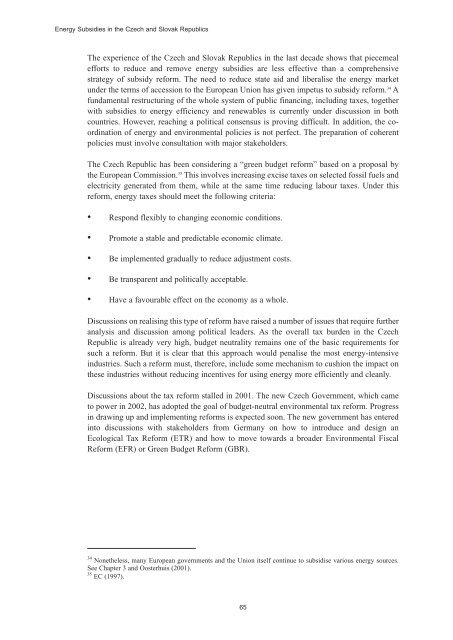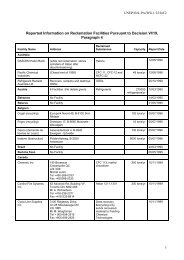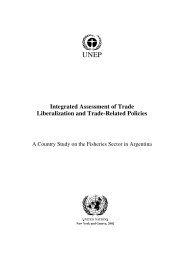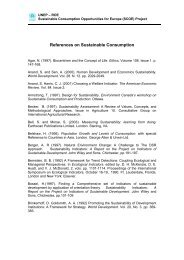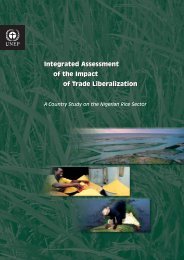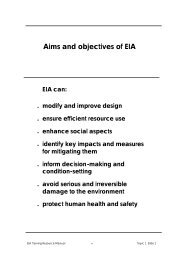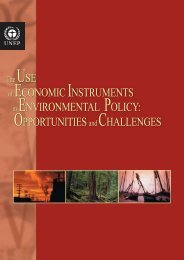Energy Subsidies: Lessons Learned in Assessing their Impact - UNEP
Energy Subsidies: Lessons Learned in Assessing their Impact - UNEP
Energy Subsidies: Lessons Learned in Assessing their Impact - UNEP
You also want an ePaper? Increase the reach of your titles
YUMPU automatically turns print PDFs into web optimized ePapers that Google loves.
<strong>Energy</strong> <strong>Subsidies</strong> <strong>in</strong> the Czech and Slovak Republics<br />
The experience of the Czech and Slovak Republics <strong>in</strong> the last decade shows that piecemeal<br />
efforts to reduce and remove energy subsidies are less effective than a comprehensive<br />
strategy of subsidy reform. The need to reduce state aid and liberalise the energy market<br />
under the terms of accession to the European Union has given impetus to subsidy reform. 34 A<br />
fundamental restructur<strong>in</strong>g of the whole system of public f<strong>in</strong>anc<strong>in</strong>g, <strong>in</strong>clud<strong>in</strong>g taxes, together<br />
with subsidies to energy efficiency and renewables is currently under discussion <strong>in</strong> both<br />
countries. However, reach<strong>in</strong>g a political consensus is prov<strong>in</strong>g difficult. In addition, the coord<strong>in</strong>ation<br />
of energy and environmental policies is not perfect. The preparation of coherent<br />
policies must <strong>in</strong>volve consultation with major stakeholders.<br />
The Czech Republic has been consider<strong>in</strong>g a “green budget reform” based on a proposal by<br />
the European Commission. 35 This <strong>in</strong>volves <strong>in</strong>creas<strong>in</strong>g excise taxes on selected fossil fuels and<br />
electricity generated from them, while at the same time reduc<strong>in</strong>g labour taxes. Under this<br />
reform, energy taxes should meet the follow<strong>in</strong>g criteria:<br />
• Respond flexibly to chang<strong>in</strong>g economic conditions.<br />
• Promote a stable and predictable economic climate.<br />
• Be implemented gradually to reduce adjustment costs.<br />
• Be transparent and politically acceptable.<br />
• Have a favourable effect on the economy as a whole.<br />
Discussions on realis<strong>in</strong>g this type of reform have raised a number of issues that require further<br />
analysis and discussion among political leaders. As the overall tax burden <strong>in</strong> the Czech<br />
Republic is already very high, budget neutrality rema<strong>in</strong>s one of the basic requirements for<br />
such a reform. But it is clear that this approach would penalise the most energy-<strong>in</strong>tensive<br />
<strong>in</strong>dustries. Such a reform must, therefore, <strong>in</strong>clude some mechanism to cushion the impact on<br />
these <strong>in</strong>dustries without reduc<strong>in</strong>g <strong>in</strong>centives for us<strong>in</strong>g energy more efficiently and cleanly.<br />
Discussions about the tax reform stalled <strong>in</strong> 2001. The new Czech Government, which came<br />
to power <strong>in</strong> 2002, has adopted the goal of budget-neutral environmental tax reform. Progress<br />
<strong>in</strong> draw<strong>in</strong>g up and implement<strong>in</strong>g reforms is expected soon. The new government has entered<br />
<strong>in</strong>to discussions with stakeholders from Germany on how to <strong>in</strong>troduce and design an<br />
Ecological Tax Reform (ETR) and how to move towards a broader Environmental Fiscal<br />
Reform (EFR) or Green Budget Reform (GBR).<br />
34 Nonetheless, many European governments and the Union itself cont<strong>in</strong>ue to subsidise various energy sources.<br />
See Chapter 3 and Oosterhuis (2001).<br />
35 EC (1997).<br />
65


